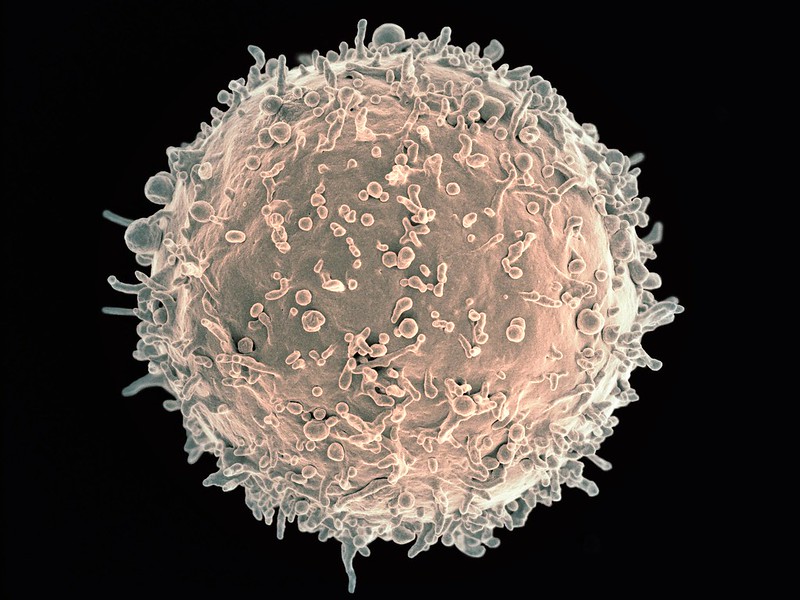
When patients in the UK showed adverse side effects during a cancer immunotherapy trial, researchers went back through the data and worked with patient samples to see what went wrong. Published in Nature, their findings provide clues into the dangerous side effects of many immunotherapies – and point to a better strategy for treating solid tumours.
“This work shows the importance of learning from early stage clinical trials,” says La Jolla Institute for Immunology (LJI) Professor Pandurangan Vijayanand, MD, PhD, who co-led the new research with Christian H. Ottensmeier, MD, PhD, FRCP, a professor with the University of Liverpool.
“In the oncology world, immunotherapy has revolutionised the way we think about treatment,” said Prof Ottensmeier. “We can give immunotherapies to patients even with metastatic and spreading disease, and then just three years later wave goodbye and tell them their cancer is cured. This is an astounding change.”
Unfortunately, only 20–30% of solid cancer patients given immunotherapies go into long-term remission. Some people see no change after immunotherapy, but others develop serious side effects, which can be debilitating, even fatal, and these patients are forced to discontinue the immunotherapy.
The researchers worked with samples from a recent UK clinical trial for head and neck cancers. The patients were given an oral cancer immunotherapy – a PI3Kδ inhibitor. At the time, PI3Kδ inhibitors had proven effective for B cell lymphomas but had not yet been tested in solid tumours.
PI3Kδ inhibitors are a new to cancer immunotherapy, but they hold promise for their ability to inhibit ‘regulatory’ T cells (Tregs). Tregs normally try to stop other T cells, called effector T cells, from targeting the body’s own tissues. Oncologists inhibit Tregs inside tumours so effector T cells can let loose and generate cancer-killing CD8+ T cells.
“Having an oral tablet that can take off the brakes – the Tregs– can be a great asset for oncologists,” said Prof Vijayanand.
Unfortunately, 12 of the 21 patients in the trial had to discontinue treatment early because they developed inflammation in the colon, a condition called colitis. “We thought this drug wouldn’t be toxic, so why was this happening?” said Prof Vijayanand.
Simon Eschweiler, PhD, an instructor at La Jolla Insitute, led the review into exactly how PI3Kδ inhibitor treatment affected immune cells in these patients. Gene sequencing showed that in the process of increasing tumour-fighting T cells in tumours, the PI3Kδ inhibitor also blocked a specific Treg cell subset from protecting the colon. Without Tregs patrolling there, pathogenic T cells, called Th17 and Tc17 cells, moved in and caused inflammation and colitis.
It was clear that a larger than needed PI3Kδ inhibitor dose had been given, and had disrupted the immune cell balance in the gut.
The pathway that leads to the toxicity seen in the new study may be broadly applicable to other organs harbouring similar Treg cells, and to other Treg cell-targeting immunotherapies like anti-CTLA-4, Eschweiler says.
The team found that intermittent dosing could be a valid treatment strategy that combines sustained anti-tumour immunity with reduced toxicity. The researchers are now designing a human clinical trial to test the intermittent dosing strategy in humans.
Why the lack of toxicity in trials for B cell lymphomas? Dr Eschweiler noted that in previous studies, lymphoma patients had been given several prior therapies leading to an overall immunocompromised state. This means the lymphoma patients didn’t have the same type or magnitude of immune response upon PI3Kδ inhibition. Meanwhile, the head and neck cancer patients were treatment-naive. Since their immune system was uncompromised, the immune-related adverse events were more rapid and pronounced.
Overall, the new study shows the importance of studying not just personalised therapies but personalised therapy doses and schedules.
Source: La Jolla Institute

